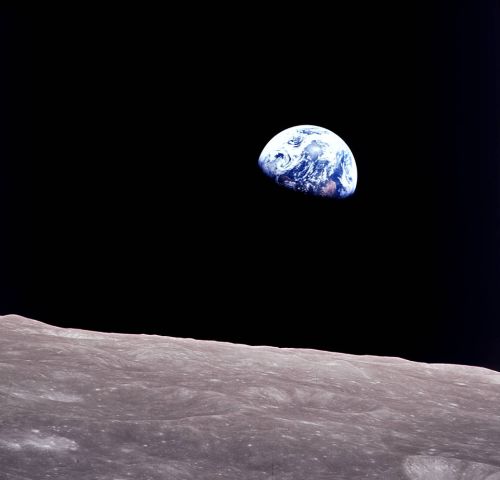How do we share the earth with those with whom we don’t share the world?
Friday, May 5, 2023, 7pmThe first images of Earth from space taken by the Apollo missions were met with contradictory responses that are telling in relation to the problems of globalism and the environmental movement today. The earth was seen as fragile, tiny, and insignificant compared to the vastness of space; at the same time, it was seen as singular, awesome, and miraculous. For some the images of earth from space triggered an urgent sense of protectiveness for our planetary home. For others, they inspired the longing to leave earth behind and find new homes beyond the precarious planet we inhabit.
Kelly Oliver discusses how these contradictory responses to seeing the Earth from space signal the need to rethink our bond to the Earth, our status as earthlings, and our relationships with Earth’s co-inhabitants.
When philosophers define the moral community, it is made up of either rational, sentient, or intentional beings, and usually human beings. What if instead, we start our ethical thinking with earthlings?
All living beings—human and nonhuman—are earthlings, at least all living beings we know of so far. Earthlings are dependent on each other for survival. We are of the earth. We belong to the earth. Yet, as different species and as different peoples, we inhabit different worlds. Even when our worlds collide, whatever our differences, we can’t deny our shared bond to the earth.
Cohabitation on our shared planet is not only our lot, but also our responsibility. We have a responsibility to share the earth even if we don’t share a world.
Kelly Oliver recently retired from Vanderbilt University, where she was Distinguished Professor of Philosophy. She is the author of sixteen scholarly books, including Earth and World, Philosophy After the Apollo Missions (Columbia UP), the editor of another thirteen books, including her most recent on Gaslighting (Oxford UP), and the author of over one hundred scholarly articles on a variety of topics including refugee detention, capital punishment, animal ethics, sexual violence, images of women and war, psychoanalysis, and film.
Her work has been translated into eight languages. She has been interviewed on ABC news, appeared on CSPAN Books, published in the New York Times and Los Angeles Times, among other appearances and publications in popular media.
Kelly is also the bestselling author of three award-winning mystery series: The Jessica James Mysteries (7 novels, contemporary suspense), The Fiona Figg Mysteries (5 novels, historical cozy—the latest, Covert in Cairo just came out last week, April 24, 2023), and The Pet Detective Mysteries (3 novels, middle grade).
